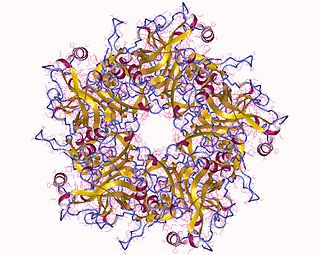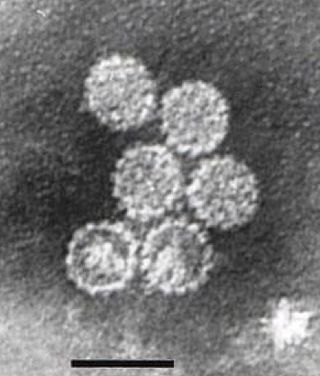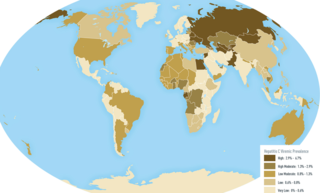Related Research Articles

Human papillomavirus infection is caused by a DNA virus from the Papillomaviridae family. Many HPV infections cause no symptoms and 90% resolve spontaneously within two years. In some cases, an HPV infection persists and results in either warts or precancerous lesions. These lesions, depending on the site affected, increase the risk of cancer of the cervix, vulva, vagina, penis, anus, mouth, tonsils, or throat. Nearly all cervical cancer is due to HPV and two strains – HPV16 and HPV18 – which account for 70% of cases. HPV16 is responsible for almost 90% of HPV-positive oropharyngeal cancers. Between 60% and 90% of the other cancers listed above are also linked to HPV. HPV6 and HPV11 are common causes of genital warts and laryngeal papillomatosis.

Genital warts are a sexually transmitted infection caused by certain types of human papillomavirus (HPV). They may be flat or project out from the surface of the skin, and their color may vary; brownish, white, pale yellow, pinkish-red, or gray. There may be a few individual warts or several, either in a cluster or merged together to look cauliflower-shaped. They can be itchy and feel burning. Usually they cause few symptoms, but can occasionally be painful. Typically they appear one to eight months following exposure. Warts are the most easily recognized symptom of genital HPV infection.

Papillomaviridae is a family of non-enveloped DNA viruses whose members are known as papillomaviruses. Several hundred species of papillomaviruses, traditionally referred to as "types", have been identified infecting all carefully inspected mammals, but also other vertebrates such as birds, snakes, turtles and fish. Infection by most papillomavirus types, depending on the type, is either asymptomatic or causes small benign tumors, known as papillomas or warts. Papillomas caused by some types, however, such as human papillomaviruses 16 and 18, carry a risk of becoming cancerous.

An oncovirus or oncogenic virus is a virus that can cause cancer. This term originated from studies of acutely transforming retroviruses in the 1950–60s, when the term "oncornaviruses" was used to denote their RNA virus origin. With the letters "RNA" removed, it now refers to any virus with a DNA or RNA genome causing cancer and is synonymous with "tumor virus" or "cancer virus". The vast majority of human and animal viruses do not cause cancer, probably because of longstanding co-evolution between the virus and its host. Oncoviruses have been important not only in epidemiology, but also in investigations of cell cycle control mechanisms such as the retinoblastoma protein.

Cervical intraepithelial neoplasia (CIN), also known as cervical dysplasia, is the abnormal growth of cells on the surface of the cervix that could potentially lead to cervical cancer. More specifically, CIN refers to the potentially precancerous transformation of cells of the cervix.

Human papillomavirus (HPV) vaccines are vaccines that prevent infection by certain types of human papillomavirus (HPV). Available HPV vaccines protect against either two, four, or nine types of HPV. All HPV vaccines protect against at least HPV types 16 and 18, which cause the greatest risk of cervical cancer. It is estimated that HPV vaccines may prevent 70% of cervical cancer, 80% of anal cancer, 60% of vaginal cancer, 40% of vulvar cancer, and show more than 90% efficacy in preventing HPV-positive oropharyngeal cancers. They additionally prevent some genital warts, with the quadrivalent and nonavalent vaccines that protect against HPV types HPV-6 and HPV-11 providing greater protection.

Gardasil is an HPV vaccine for use in the prevention of certain strains of human papillomavirus (HPV). It was developed by Merck & Co. High-risk human papilloma virus (hr-HPV) genital infection is the most common sexually transmitted infection among women. The HPV strains that Gardasil protects against are sexually transmitted, specifically HPV types 6, 11, 16 and 18. HPV types 16 and 18 cause an estimated 70% of cervical cancers, and are responsible for most HPV-induced anal, vulvar, vaginal, and penile cancer cases. HPV types 6 and 11 cause an estimated 90% of genital warts cases. HPV type 16 is responsible for almost 90% of HPV-positive oropharyngeal cancers, and the prevalence is higher in males than females. Though Gardasil does not treat existing infection, vaccination is still recommended for HPV-positive individuals, as it may protect against one or more different strains of the disease.

Bovine papillomaviruses (BPV) are a paraphyletic group of DNA viruses of the subfamily Firstpapillomavirinae of Papillomaviridae that are common in cattle. All BPVs have a circular double-stranded DNA genome. Infection causes warts of the skin and alimentary tract, and more rarely cancers of the alimentary tract and urinary bladder. They are also thought to cause the skin tumour equine sarcoid in horses and donkeys.
Cervarix is a vaccine against certain types of cancer-causing human papillomavirus (HPV).
An anal Pap smear is the anal counterpart of the cervical Pap smear. It is used for the early detection of anal cancer. Some types of human papillomavirus (HPV) can cause anal cancer. Other HPV types cause anogenital warts. Cigarette smokers, men who have sex with men, individuals with a history of immunosuppression and women with a history of cervical, vaginal and vulval cancer are at increased risk of getting anal cancer. Vaccination against HPV before initial sexual exposure can reduce the risk of anal cancer.
A subunit vaccine is a vaccine that contains purified parts of the pathogen that are antigenic, or necessary to elicit a protective immune response. Subunit vaccine can be made from dissembled viral particles in cell culture or recombinant DNA expression, in which case it is a recombinant subunit vaccine.

Stephen C. Harrison is professor of biological chemistry and molecular pharmacology, professor of pediatrics, and director of the Center for Molecular and Cellular Dynamics of Harvard Medical School, head of the Laboratory of Molecular Medicine at Boston Children's Hospital, and investigator of the Howard Hughes Medical Institute.
Jian Zhou was a Chinese virologist and cancer researcher, who with fellow researcher Ian Frazer, invented Gardasil and Cervarix, the vaccines for stimulating human immunological resistance to the cervical cancer-inducing human papilloma virus.
Diane Medved Harper is a professor in the Department of Family Medicine at the University of Michigan. Her area of expertise is human papillomavirus (HPV) and the diseases associated with it, as well as colposcopy, and she was one of the investigators in the clinical trials of Gardasil and Cervarix, vaccines against HPV.
Anna-Lise WilliamsonMASSAf is a Professor of Virology at the University of Cape Town. Williamson obtained her PhD from the University of the Witwatersrand in 1985. Her area of expertise is human papillomavirus, but is also known on an international level for her work in developing vaccines for HIV. These vaccines have been introduce in phase 1 of clinical trial. Williamson has published more than 120 papers.
Lutz Gissmann is a German virologist and was head of the division Genome Modifications and Carcinogenesis at the German Cancer Research Center (DKFZ) in Heidelberg until his retirement in 2015. Lutz Gissmann is known for his seminal research in the field of human papillomaviruses (HPV) and their causal association with human cancer, especially cervical cancer. In his early work, he demonstrated genetic heterogeneity among HPV isolates leading the way to the now well-established concept of distinct HPV types of which some are associated with specific benign or malignant disease. In the early 1980s in the laboratory of later Nobel Prize laureate Harald zur Hausen he was the first to isolate and characterize HPV16 and HPV18, the two most oncogenic HPV types causing the vast majority of HPV-induced anogenital and head-and-neck cancers. This groundbreaking work of Lutz Gissmann provided experimental evidence for the causal association of specific HPV types with human cancer, and laid the foundation for the development of prophylactic HPV vaccines for the prevention of cervical cancer and other HPV-induced cancers. His current research interest is on development of second generation prophylactic and therapeutic HPV vaccines.

The HPV Prevention and Control Board, founded in 2015, is an independent group of international experts supported by unrestricted grants from the pharmaceutical industry that bring together key professionals, groups and government officials to deal with issues related to screening and prevention programmes for human papillomavirus (HPV) infection, the persistence of which may lead to cervical cancer, the second most common cancer in women living in low-resource settings. The Board focusses on preventing cervical cancer in these countries by promoting the sharing of information on cervical screening and HPV vaccination, which by 2014 had reached only around 3% of eligible girls in low income countries.
The Lancet Group of Laboratories, also known as Lancet Laboratories, is a private pathology service founded and based in Johannesburg, South Africa.
Carolyn Williamson is a South African virologist and microbiologist who is a professor of medical virology at the University of Cape Town. She is a fellow of the Royal Society of South Africa and the African Academy of Sciences, and a member of the Academy of Science of South Africa. Her research focuses on HIV vaccine development and prevention of the disease.

Human Papillomavirus in Ghana; each year about 3,000 Ghanaian women are diagnosed cervical cancer caused by Human Papillomavirus, HPV. It is estimated that 2,000 women die out of the 3000 annually.
References
- 1 2 3 4 "Eftyhia Vardas". The Conversation. Retrieved 3 January 2022.
- 1 2 3 "Prof Eftyhia Vardas". WCIM 2018. Retrieved 3 January 2022.
- ↑ "Trial of potentially variant-proof vaccine ongoing in Western Cape | Institute Of Infectious Disease and Molecular Medicine". www.idm.uct.ac.za. Retrieved 3 January 2022.
- ↑ "Inside the South African lab that discovered Omicron". Africanews. Retrieved 7 January 2022.
- ↑ Abbott, Alison (27 July 2020). "Therapeutic HIV vaccines show promise". Scientific American. Retrieved 7 January 2022.
- ↑ "Vardas, Eftyhia (Prof) | Institute of Cape Wine Masters". www.icwm.co.za. Retrieved 7 January 2022.
- ↑ "Five new Cape Wine Masters graduate". wine.co.za. 13 May 2009. Retrieved 7 January 2022.